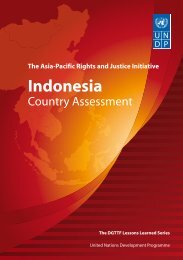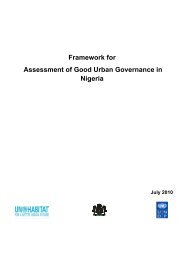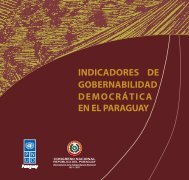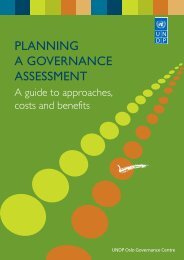A Users' Guide to Measuring Local Governance
A Users' Guide to Measuring Local Governance
A Users' Guide to Measuring Local Governance
You also want an ePaper? Increase the reach of your titles
YUMPU automatically turns print PDFs into web optimized ePapers that Google loves.
Box 12.<br />
Communicating research<br />
Research on its own cannot bring about change. Research must be communicated in an appropriate form if new<br />
knowledge is <strong>to</strong> bring about improvements in the lives of the world’s poorest people.The research must also be useful<br />
and accessible <strong>to</strong> people, who may require additional skills and capacity <strong>to</strong> enable this. Experience tells us that<br />
nless communication of research is planned for throughout a research programme, including once it’s completed, then<br />
research uptake and impact may be limited 21 . A <strong>to</strong>p-down, linear approach <strong>to</strong> communication, where a homogenous<br />
group of end users receive information, is unlikely <strong>to</strong> lead <strong>to</strong> change. Communication of research should be an<br />
iterative, interactive and multi-directional process that involves a wide range of stakeholders from planning, through <strong>to</strong><br />
design, implementation and moni<strong>to</strong>ring and evaluation. The shortcomings of the linear model are widely recognised,<br />
and the question that is asked instead concerns research uptake pathways:‘Why are some of the ideas that circulate in<br />
the research/policy networks picked up and acted on, while others are ignored and disappear?’ Or, <strong>to</strong> phrase it from the<br />
perspective of those engaged in research:‘How can we market our ideas so that they are noticed? What do we have <strong>to</strong><br />
do <strong>to</strong> influence policy in a pro-poor and evidence-based direction?<br />
Box 13.<br />
Translating assessment results in<strong>to</strong> recommendations<br />
Here are six pointers for translating assessment results in<strong>to</strong> recommendations for improvements in local governance:<br />
1 Identify the most urgent priorities for making improvements in local governance and craft recommendations that<br />
can help address these most urgent issues from an immediate, medium-term and long-term perspective.<br />
2 Isolate those aspects of local governance which municipal authorities and administra<strong>to</strong>rs can address on their own<br />
and those that require the involvement of other stakeholders (such as national or regional officials).<br />
3 Build on the strengths that are identified in the assessment and do not focus only on the shortcomings that the<br />
evaluation has brought <strong>to</strong> the surface or highlighted.<br />
4 Separate out problems that require major institutional change, those that involve personalities or individuals, and<br />
those than can be addressed through policy change.<br />
5 Develop an approach <strong>to</strong> making recommendations that links systemic problems with an integrated effort <strong>to</strong><br />
ameliorate them over time. That is, rather than developing a simple list of things that could be done <strong>to</strong> improve<br />
local level governance, participants are asked <strong>to</strong> think through a strategy that first addresses why the problems<br />
have occurred and then comes up with a series of steps involving political leaders, civic ac<strong>to</strong>rs and citizens.<br />
6. Sketch out a way in which these steps can unfold over a defined period of time (with the most critical concerns<br />
addressed immediately while at the same time developing a longer-term approach) and identify methods for<br />
moni<strong>to</strong>ring progress on improving democracy.<br />
Source: Adapted from IDEA (2002) <strong>Local</strong> Democracy Assessment <strong>Guide</strong><br />
http://www.idea.int/democracy/upload/<strong>Local</strong>_Dem_Assessment_<strong>Guide</strong>.pdf<br />
21<br />
From United Kingdom Department for International Development (DFID) Research on Communication and Getting Research in<strong>to</strong><br />
Use http://www.dfid.gov.uk/consultations/crd/section5.pdf<br />
A Users’ <strong>Guide</strong> <strong>to</strong> <strong>Measuring</strong> <strong>Local</strong> <strong>Governance</strong> 21


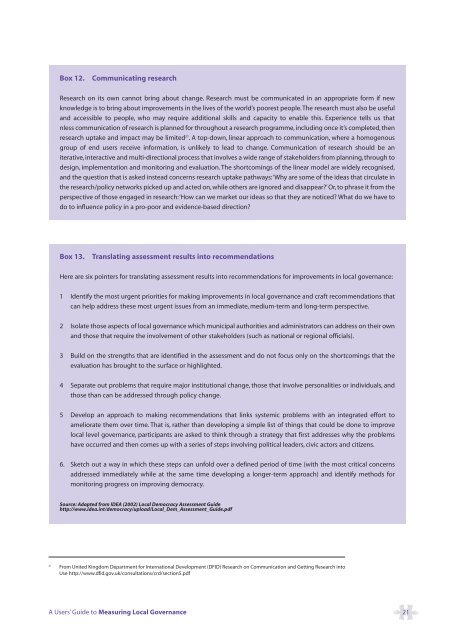

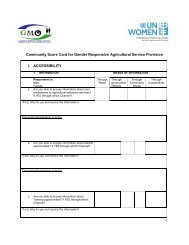
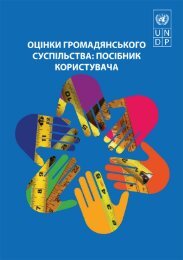
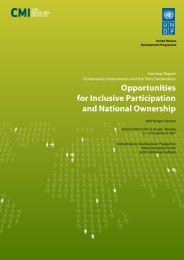
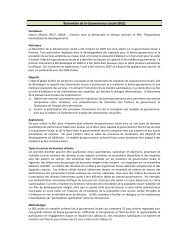
![GuÃa del Usuario ] - Governance Assessment Portal](https://img.yumpu.com/44740603/1/190x253/gua-a-del-usuario-governance-assessment-portal.jpg?quality=85)
